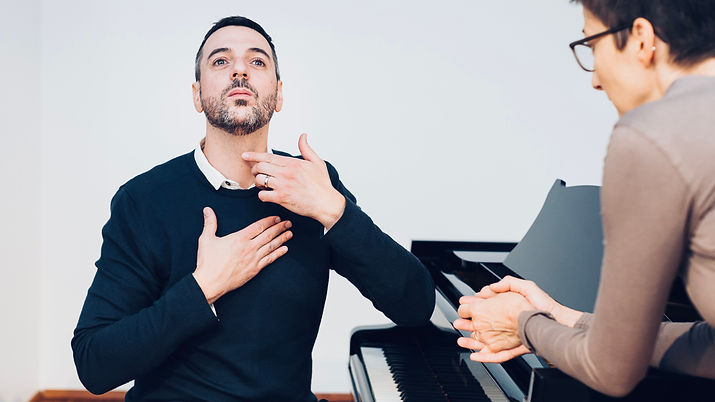
Instruction
about the technique
The individuality of our voices forms the basis for my Instruction. A singing lesson can be a very dynamic event in many areas requires flexibility. The lessons offer many spheres of communication and working with each other. We don't just limit ourselves to the so-called vocal apparatus, but to various aspects that, when combined, create and support a free and healthy voice.
A mixture of proven methods and personalized exercises form the basis of my work. Here I rely, among other things, on very good teachers who have had a particular influence on my career, as well as my many years of experience, which have enabled me to develop my own method which I continually improve. It is very important to me to turn students into self-determined and creative singers. They should be able to rely on their instrument and learn to care for it and enjoy using it.
It is also very important to me to work in an interdisciplinary manner and to offer different perspectives and solutions. I feel committed to an old tradition that focuses on the health and well-being of the voice and the singer. So I want to be amazed at my students and their results, support them and approach the miracle of music with openness and without shyness.
Part of the teaching also includes working on stage presence as well as the expression and development of literature and the realization of an artistic performance on all levels. For this purpose, I work with very good and experienced accompanists who are happy to support us with their experience.
Finally, it should be mentioned that my teaching is not based on rigid concepts. There is a clear scientific foundation that has been formed over many centuries and created many variants of learning and teaching. One constant applies and contradicts the attempt to impose a concept on a student: Every person is unique. This is also a central aspect of my work.
singing and health
Music holds the key to a special power that lies dormant in all of us. The effect on our well-being is expressed in many different ways and is particularly important in an increasingly complex world. Our intrinsic motivation onemusical Activityto pursue, probably comes from the desire to express emotionsand us with our environmentconnect. At first this will be hesitant and the first steps may seem small and cautious. In most cases, this phase initiates a change in self-perception.
A very important aspect of singing is breathing. Our calm, our strength, our self-confidence and our focus are based on breathing. When we tackle something, when we break away from something, when we rebel and when we dance - we always do so in harmony with our breathing. It works so naturally that we usually don't even think about it.
Singing has a positive influence on the cardiovascular system and our mood. Timed breathing, coupled with singing, leads to significantly lower blood pressure after the activity, as well as a generally better sense of well-being. In general, the study situation here is somewhat poor. This field offers an immense amount of space for different questions. However, evidence suggests that blood pressure, cortisol levels and heart rate benefit from regular singing.
Great progress can be seen in the work with COPD sufferers, Parkinson's patients and dementia sufferers. Here, too, we are only at the beginning and must certainly redefine the role of singing in our well-being and make access lower-threshold.

for KIDS
Children have an irrepressible urge to explore things. They usually go to work casually and without reservations and then lose themselves in their world. I find this aspect the most exciting. This is where we get the most creativity from. “Losing yourself” is extremely important for our brain. A phase is emerging that offers us new opportunities and allows us to learn a lot. The subconscious is addressed and the gut feeling is strengthened.
Music, which can be shaped in so many ways, is best discovered and explored through play. This process is different for every child and should not follow a set pattern.
I also like to integrate various instruments such as drums and string instruments into my lessons, and try to convey elements such as rhythm, melody and harmony in a natural way.
The voice and the body are of course the focus. But movement is also an essential part of making music. Free and individually designed movement elements, such as dance, also complement our lessons.
Music has a special and wonderful quality: it listens to us. She listens to our thoughts and dreams. It makes sounding and audible what needs to come out but often cannot come out. I always find that people - whether adults or children - leave class with a smile on their face.
Not addressing something directly, but transforming it into music is an extremely important skill that greatly enriches life and makes many things easier. Self-confidence is strengthened and a particularly sustainable form of body perception develops.
I would like to introduce your children to the world of music without pressure and with fun. We select the pedagogical means carefully and change them if necessary.
Your children should have fun and be amazed at themselves and their possibilities, then everything will happen on its own. I always incorporate the basics of music (music theory) into lessons in a playful way, as long as it doesn't disturb.
Edu
roots
cational
University of Vienna
Musicology
singing
Yuly Khomenko
Gabriele Sima
Grace Bumbry